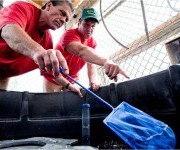habitat protection
-
Why prison inmates make great conservationists
Kelli Bush, project manager for Washington state’s Sustainable Prisons Project, works with an unlikely group of conservationists: prison inmates. In collaboration with scientists, students, community groups, and prison staff, inmates at four Washington correctional facilities play an integral part in habitat and species restoration efforts. They raise Oregon spotted frogs (endangered in Washington), Taylor’s checkerspot […]
-
Gerod Rody
Art: Nat Damm Gerod Rody Founder, Out for Sustainability Seattle, Wash. Gerod Rody, 29, felt a disconnect between his life as a gay man and his work in the sustainability field, so he founded Out for Sustainability to bring the two together and encourage the LGBTQ community to embrace the green cause. The group is celebrating the […]
-
Images of an evolving world by artist Don Simon
These images are from a series of drawings titled “Unnaturalism” by artist Don Simon. His work examines the impact of industrialization and sprawl on ecosystems. From his artist statement: “Throughout history, particularly since the beginning of the Industrial Revolution, mankind has been less than kind to our cohabitants on the planet. We build, produce, and […]
-
Few Americans are ever likely to see George W. Bush's greatest environmental legacy
Behold Bush’s environmental legacy. Photo: nasa.gov My assignment, which I chose to accept, is to offer a tangent of positive thoughts about the Bush administration’s environmental record before readers return to the barrage of verbal drubbing that other Grist writers are no doubt serving up. Rather than pick out nuggets that lie here and there […]
-
Bush's last marine protection area isn't so much with the protection
On Tuesday the Bush administration announced plans to create the world's largest marine protection area in the Pacific Ocean.
It's a big deal. Huge even. Progressives like Jonathan Stein are rightly shocked and excited.
Remember though, an attitude of utter cynicism toward the Bush administration has served as an unfailingly accurate guide for eight years now. Let's not be too quick to give it up.
After all, there's this:
Two years ago with fanfare, President Bush declared a remote chain of Hawaiian islands the biggest, most environmentally protected area of ocean in the world.
It hasn't worked out that way.
Cleanup efforts have slowed, garbage is still piling up and Bush has cut his budget request by 80%.And one wonders just how a cash-strapped federal government plans to police this brand new marine sanctuary. Turns out, Jim Connaughton, Chairman of the White House Council on Environmental Quality, was asked just that earlier this week during a press briefing:
Q: Two questions. One, you mentioned monitoring. You also mentioned how remote this area is -- and I have actually fished this area quite a bit. And my question to you is, monitoring is one thing, but enforcement is an entirely different issue. And I don't honestly see how you can enforce any of this out there with the amount of government-based traffic that you have in the area. How do you plan to enforce these laws?
CHAIRMAN CONNAUGHTON: Well, let's begin -- first, this is our experience -- these are challenging areas to get to, so there's an embedded enforcement of just the difficulty of getting to these areas. Two, we operate from the presumption that most people who care about the resource, including your constituency, are law-abiding citizens, and so we expect that there will be a fair amount of increased awareness of the importance of the resource, and certainly that the boating community is very good about staying up to date on charts, especially the adventurous boating community, and staying up to date on -- just for safety purposes -- the conditions with respect to these remote areas.
Now, is there the potential for some Chinese commercial fishing fleet to come in and intrude the area? The answer to that is yes. And so one of our goals is through the management planning, and through several years of building out capacity, to also build out our capability to enforce.So, the president's plan is to someday get around to have better enforcement. As to monitoring, Connaughton had this to say:
-
A legacy-making move for the outgoing prez
President George W. Bush deserves praise from ocean lovers for his creation of three new marine national monuments in the Pacific Ocean. This action protects some of the few remaining pristine coral reefs in the world by prohibiting all forms of commercial fishing and severely restricting recreational fishing.
These are among the last places on the planet where you can still see sharks and other top predators in something like a healthy state. President Bush -- and the Pew Environment Group, Marine Conservation Biology Institute and Environmental Defense Fund, who worked so hard for these monuments -- can be justifiably proud of the results.
It's easy to point out that the protected areas around the 10 islands could have been 16-times larger if Bush had included the full 200-mile exclusive economic zone in the monuments. As National Geographic scientist Enric Sala points out, there's no magic scientific line at 50 miles. It looks more like a political line to me.
-
Competing offer for U.S. Sugar complicates Everglades restoration plan
Florida’s intent buy out a giant sugar operation in a move to restore the Everglades is being complicated by a competing offer from the Lawrence Group, a Tennessee farming company. sources:
-
No cash yet offered to save Ecuador rainforest as deadline looms
In June 2007, Ecuador offered to avoid oil development in a tract of biodiverse rainforest if other nations and green groups were able to pony up $350 million a year for a decade. Reaction to the pay-to-protect idea was positive, but a twice-bumped-back deadline is coming up in Dec. 2008, and still no funding is […]
-
Oregon looks to protect its ocean ecology
Amidst the slavering cries to drill pretty much everywhere, it’s encouraging to hear the news from Oregon. The state’s Department of Fish and Wildlife has just finished accepting proposals for new marine reserves — protected places where Oregon’s maritime ecology can thrive. A coalition of conservation leaders has developed an ambitious and smart proposal. Now […]

